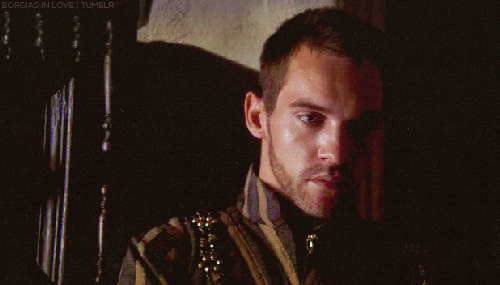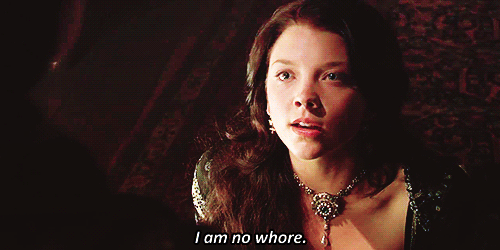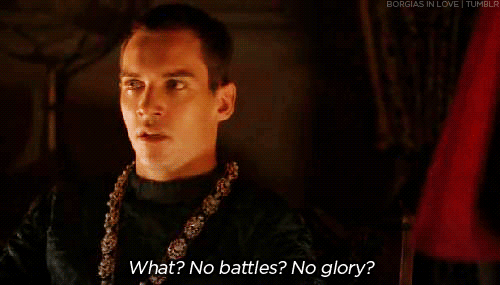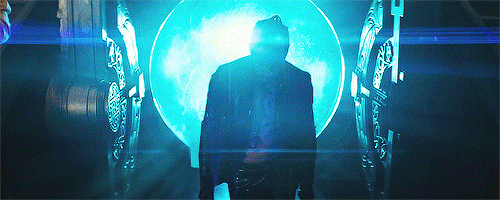Like most people, I have a strange and unexplainable fascination with all things Tudor, especially Anne Boleyn. Frankly, she was a badass in her own right and impacted English history so much even though this wasn’t fully appreciated until many years after her unjust sentencing and beheading. Plus, I happen to love the Showtime TV series The Tudors for three very delicious reasons: Jonathan Rhys Meyers, Henry Cavil and Natalie Dormer. Meyers in particular was a spectacular Henry and it made my heart so happy. (Then I saw him in City of Bones earlier this year and had a sad.)
So when I happened to see this modern day, teenage retelling of Henry VIII and Anne Boleyn, I was all over that thing like white on rice. I had some questions and reservations as a lot of peeps did, I’m sure, but I held out hope for something awesome. I shouldn’t have.
Mild spoilers ahead.
This is going to sound really harsh, but I’m not sure how else to put it: Anne & Henry is a cheap, watered-down, trivialized, cliché-filled re-imagining of one of the most epic tragedies in English history and I wipe my hands of it.
The really sad part? Anne & Henry started off great for me. I really felt like Anne’s character captured Anne Boleyn’s cunning and confidence perfectly. She was bold, in your face, unapologetic and had sass for days. I loved her character, even until the end. Her slow decent into despair over losing Henry’s favor was the strongest point of this novel and the only saving grace, to be frank. Everything else kinda pissed me off like nothing else.
The biggest issue I had was that Anne & Henry’s story just doesn’t seem to translate well into a modern day, teenage-angst-filled contemporary. Let me set the scene for you: Henry is the president of his school’s student council, an aspiring politician and belongs to one of the most influential families in that community. Anne, on the other hand, is from poorer beginnings, her mother marries into wealth and moves to Henry’s community before the start of the novel. No one accepts Anne and her mother, naturally, but of course, Henry notices Anne immediately and can’t seem to shake her from his head because she’s not like the girls he’s used to. >insert dramatic side-eye here< Oh wait… Meyers has a gif for that.

If you’re familiar with what happened to the real Anne Boleyn, then you already know the bare bones of the plot. Henry’s closest friends and confidants don’t care for Anne and feel she poses a threat to him. So they conspire to set her up. This part of the book is true to history. But, as I said before, this is much smaller scale. In real life, many people disliked Anne because of her Protestant beliefs and because her relationship with Henry led to him annulling his marriage to Catherine of Aragon, his excommunication from Catholic Church and, eventually, the English Reformation.
So how do you do this on a high school scale? Simple answer: you don’t because you can’t.
In Anne & Henry, people dislike Anne because she simply “doesn’t fit in” and isn’t “the right girl” for Henry. She also is painted as a bad influence (she rides a motorcycle, drinks, is comfortable in her body [read: slut] and distracts Henry from his future goals of eventually becoming president) and gold digger. Anne doesn’t dramatically change Henry’s views or the school or the community. She registers as nothing more than a blip on a radar. There’s no evidence to suggest ANYONE thought of her after the events in the book. (The only real similarity I could pick out is that favor of the people remained with Catherine throughout the book.) So it’s in this way that I wonder what the point was of writing a re-telling? Take out all the historical names and I probably would have pegged this as a random YA contemporary with casual slut-shaming.

In many ways, the novel trivialized the real Anne’s story because she had bigger problems other than just losing her teenaged boyfriend. I’m not usually a fan of YA novels that rely on the whole “even though I’m 16 years old, I plan to be with this teen boy forever and ever because I’m in love” trope. I get that those feelings exist, I do. But those stories fail more often than they succeed for me because I don’t connect well with those relationships. And that’s pretty much exactly what happens in Anne & Henry. The passion is fast and strong, which, unfortunately, didn’t work well with the pacing and made it bodyrock onto the insta-love dance floor. And at one point, I was starting to get frustrated by the lack of sexy times because of all the sexual tension I was getting pounded with (hahah, puns). Thankfully, there is exactly ONE and it’s your standard issued fade-to-black scene, and thusly, very anticlimactic.
Actually everything about this novel was pretty anticlimactic and after the 50% mark and I struggled to stay interested. Even after the motorcycle accident, which was supposed to be the climax, zero fucks could be conjured. Meyers and I were extremely disappointed.

Then the last 75% descended into ultimate frustration because of Henry. Anne & Henry is told in duel point-of-view and we have the unfortunate calamity to be in Henry’s head when he’s at his worst and being a colossal dick. He blames Anne for their drunken motorcycle accident (because it made him look bad, not because he could have gotten hurt!); blames Anne when his best friend, who he knows she hates, is found in a picture kissing her; blames Anne for the entire Party from Hell even though he knows his friends purposefully got her drunk, set her up and took advantage of her. Then he held a mock trial to expel her from school, her charges ranging from cursing on school grounds to accidentally damaging school property. Such a catch, this one.
I know the biggest question here is this: Does Anne lose her head? And to that I answer: yes and no. It’s metaphoric and I think the only persons to really grasp the metaphor is Anne and the reader. So by the end, I was angry for Anne’s sake because like history, Anne’s trial was unjust and a heaping pile of dog shit, but as a modern day retelling, it doesn’t conjure up the same amount feelings. Historians can look back at the real Anne’s trial and see the holes, but I’d like to think with advancements in science, thinking and hindsight, that helped contribute to the finding of those holes. But Anne & Henry has the benefit of modern technology and hard evidence, most of which Henry had available to him and chose not to use just because and it completely conflicted with the kind of person Ius developed from the beginning.
Perhaps the most frustrating part is that I was secretly hoping that Ius would break the mold and give Anne some sort of justice. But maybe the peace of mind comes from the fact that she did not, in fact, literally die in this retelling. Still, it would have been nice to see heads roll…
Should you read Anne & Henry? I don’t know. It’s not a book I can put my seal of approval on, but I won’t smack your hand if you were picking it up in a bookstore. I’d definitely say this is one feels like a library rental more than anything else due to the reduction of history’s most iconic figures to high school stereotypes. But on the plus side, it’s a fairly short read, so there’s that. As for me, I’m going to do the same thing I did when I saw Jonathan Rhys Meyer’s performance in City of Bones…

…and pretend it never happened.


Amanda
Bust! I had hoped for something awesome – hasn’t poor Anne been slut shamed enough? I am glad to know I can pass on this one.
Beth W
Thanks for the honesty! I think you’re right- the historic events (whether you laud Anne as a sassy protagonist or fear her as the catalyst that changed the way monarchs treated their countrymen forever after) cannot translate to a modern setting. Henry’s obsession with Anne changed EVERYTHING: the politics of England and the rest of Catholic Europe, the stance taken toward the church (and the excuse of tragedies inflicted upon church members), the existence of divorce, the creation of the Church of England, the concept of heresy, the ability for the poor to become “social climbers” through wit (not only Anne and her successors, but Thomas Cromwell, etc.), the power of the king in condemning and killing others (not only his ex-wives, for convenience, but the new ‘enemies of the crown’), succession in the English monarchy, not to mention paved the way for the reign of Elizabeth I. There’s just no way to take something that huge (so huge the players at the time all alluded to it in writings; they knew they were in the midst of huge changes) and make it YA.
Vane J.
It’s so sad to see a book with such potential didn’t meet your expectations. As you, I have a deep interest for all things Tudor, and Anne goes amongst them. The complexity of the real story is impossible to captivate in a contemporary novel, so I ca’t really say I’m surprised to see this didn’t do it justice. I don’t think I will read this because I’m not a fan of contemporary high school dramas.
Natalie M.
It sucks when a book doesn’t live up to your expectations. Avoiding this one for sure.
Carina Olsen
Gorgeous review Steph. <3 But aw, I'm so sorry that this book was so disappointing :\ it sounds aaawful. Sigh. Not for me at all 🙂 Thank you for sharing and being honest. <3 You are awesome.
Ksenia @ Ksenia's Book Blog
I agree that high school drama and historical events of the time are on different scales. I don’t think I’ll be picking up this book. Great review, Steph.
Alex
I can totally see where you’re coming from! I disliked a lot of it and I had a difficult time giving it 3 stars, but I did because of the simple fact that at the time I did enjoy it.
Alex @ Book Chick